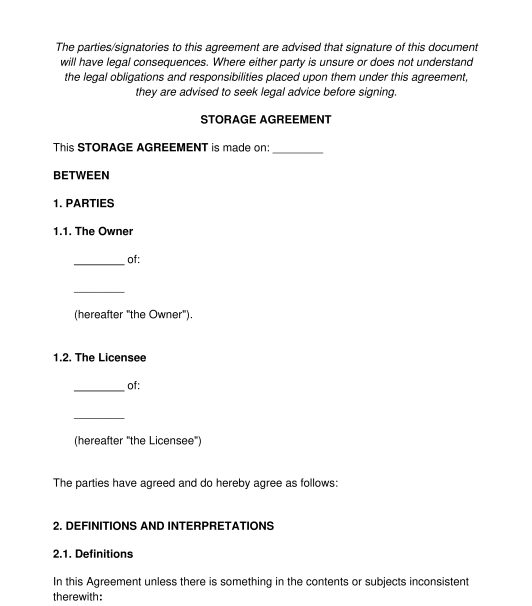 02/11/2025
02/11/2025

Answer a few questions and your document is created automatically.

Your document is ready! You will receive it in Word and PDF formats. You will be able to modify it.

 02/11/2025
02/11/2025
 Word and PDF
Word and PDF
 9 to 14 pages
9 to 14 pages
A storage agreement is an agreement under which one party will grant permission for another party to store goods in their property, in exchange for a fee (rent).
A storage agreement will only grant permission for somebody to use an area or space in a property for the purpose of storing goods. A tenant under a business lease agreement will have permission to occupy a property as a tenant and will have particular rights and responsibilities in connection with the tenancy, including specific notice periods and processes that apply to eviction.
No. It is possible to grant permission to use a space for storage verbally or informally. However, it is helpful to have a written agreement so that each party has a clear understanding of their rights and responsibilities.
Before a party enters into a storage agreement, they should:
The parties may both be individuals. In this case, they should be over 18 and have full legal capacity. Legal capacity refers to a situation where a person has the ability to understand and make legal decisions for themselves.
The parties may also be corporate entities (such as a company or a LLP).
The storage agreement can:
After the document has been signed, each party should retain a copy containing the signature of each party.
The agreement is not reviewed by a lawyer to ensure that the legal content applies to the personal situation of the parties. In order to review the particulars of the agreement, the parties can instruct a lawyer. It will be necessary to consult with a lawyer who is regulated by an approved regulator in the legal services sector. It is possible to search for a lawyer using the Law Society find a solicitor page in: England and Wales, Northern Ireland or Scotland.
If one party breaches the terms of an agreement the other party may wish to:
The following goods should not be stored under a storage agreement:
A storage agreement should:
This is not a business lease or tenancy agreement.
The contract is a simple licence and is governed by the general principles of contractual law.
Where the business that owns the storage space is based in England and Wales or Northern Ireland, rights regarding third parties are also addressed in the Contracts (Rights of Third Parties) Act 1999.
Both parties should also be aware of the provisions of the Unfair Contract Terms Act 1977.
You fill out a form. The document is created before your eyes as you respond to the questions.
At the end, you receive it in Word and PDF formats. You can modify it and reuse it.
A guide to help you: Signing Documents in England and Wales
Storage Agreement - Sample, template - Word & PDF
Country: United Kingdom